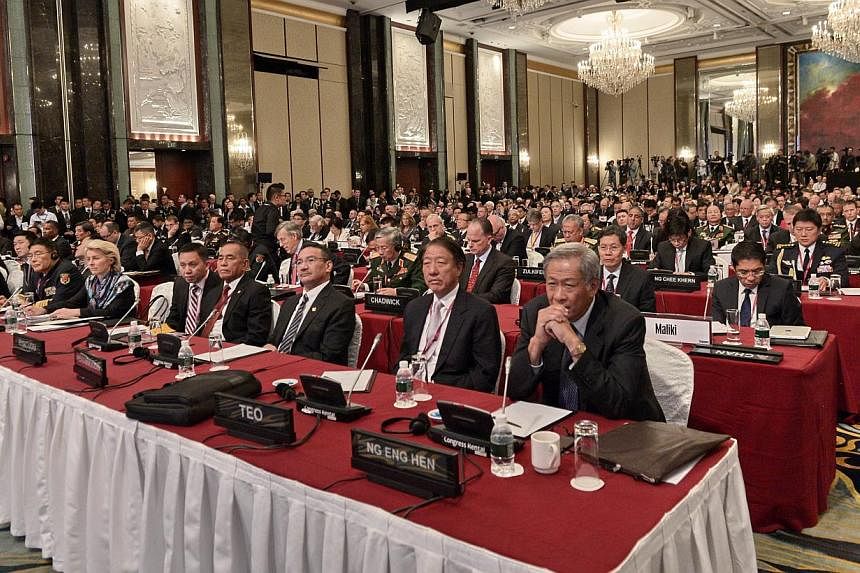Shangri-La, or the valley of scent, refers to a fictional land of eternal happiness. Once made famous by films and novels, this name has been adopted by numerous cafes and eateries. A hotel under the same name accommodates the Shangri-La Dialogue (SLD), hosted by the International Institute for Strategic Studies and currently one of the world's highest-level and most prominent forums.
Many countries are organising their own forums to make their voices heard, but the Halifax International Security Forum is under US influence, and the Munich Security Conference is centred on European issues. However, all eyes are now on the Asia-Pacific, with its dynamic economy and changing regional situations including the US strategic rebalancing to Asia, Japan's drive for a normal state and the rise of China. Yet other forums like the Seoul Defence Dialogue primarily focus on regional issues - hence the prominence of the SLD as a platform to discuss the current state of affairs in this region.
The SLD takes place in South-east Asia - the region's geopolitical hub - and is based on the Commonwealth network between Britain and its former colony Singapore, along with the covert support of the United States.
It boasts a 14-year store of know-how in conducting a high- level "Track 1" defence dialogue. The forum has had influence on confrontational issues such as the territorial disputes in the East and South China seas, and on discussions about global security through keynote addresses by controversial figures, including Japanese Prime Minister Shinzo Abe.
However, despite the short- to medium-term authority and influence of the SLD, its medium- to long-run prominence will be affected by the existence of the rival Xiangshan Forum.
Interestingly, the word "xiangshan" translates as "the mountain of scent", similar to what the name "Shangri-La" implies. This is the name of a famous mountain in the vicinity of Beijing, China; and, at the same time, of a biennial security forum hosted by the China Military Sciences Society since 2006.
The fifth Xiangshan Forum last year, with the presence of 500 high-profile military leaders and security experts from all around the world, was a huge success.
There are three reasons that the Xiangshan Forum is rising to become a formidable rival of the SLD.
First, the Xiangshan Forum draws attention and obtains support from Mr Xi Jinping, China's supreme leader. It enjoys an upgraded status as a common military platform on par with Mr Xi's "proactive" diplomacy. The forum is scheduled to be held on an annual basis from this year, and will include the China Institute for International Strategic Studies as a co-host, in a sign that the Chinese Ministry of National Defence will commit all its capabilities to this conference. The forum is set to outsize the SLD in no time, and will also match the dialogue within the near future.
Second, the Xiangshan Forum and the SLD have different networks and support groups. While the latter is supported by the network of southern Asian countries and Western nations including the US, the former is notably joined and supported by northern Asian players that do not belong to the Western sphere of influence.
This reveals the gap between advocates of America's status quo and those of a new order envisioned by China. Countries may possibly be forced to choose between the two forums if they believe their defence minister's presence at both meetings every year is impractical, and this will show which side they prefer to be on.
Third, the Xiangshan Forum is an arena for China's face-off with the US in the "discourse warfare" that both sides have been waging. The phrase "discourse warfare" refers to the use of media and psychology in the waging of war through non-combat campaigns.
The SLD and the Xiangshan Forum will now become battlegrounds for Sino-American discourse. As can be seen by its proposal for the new Asian security concept, China seeks a re-arrangement of the regional security architecture. China will place emphasis on community, diversity and generosity, while creating discourse for reshaping the regional order.
How should the SLD evolve in the future?
The dialogue should not be a mere talk shop or an arena for arguments; it should deliver and disseminate certain values. The SLD must, in order to maintain its prominence in the future, keep its strength of discourse at a not-too-extreme level.
To make an analogy, the "scent" of the discourse must be neither too strong nor too weak - the former will provoke resistance from participants, and the latter will not draw any attention. The dialogue should pick a more harmonising agenda and reach a more reconciliatory conclusion instead of discussions on confrontational issues, while, at the same time, retain its leading role in presenting important issues as it has done so far.
The SLD and the Xiangshan Forum will become the world's most prominent forums, and will provide a yardstick by which to measure the degree and depth of American and Chinese influence, respectively. The SLD will no longer be able to monopolise the agenda, but will share the discussion on global security with the Xiangshan Forum.
Above all, both forums should contribute to saving mankind from threats and realising a safe world through their discourse.
All in all, I am looking forward to the co-existence of and friendly rivalry between the SLD and the Xiangshan Forum.
An open and multilateral approach, future-looking action as opposed to the obsession with the current state of affairs, and the advancement of future-oriented agendas will enable the two forums to contribute to regional security through friendly and mutually beneficial competition. I hope for a pleasant "scent" from both dialogues.
The writer is a professor of international relations at Hankuk University of Foreign Studies in Seoul, South Korea.

